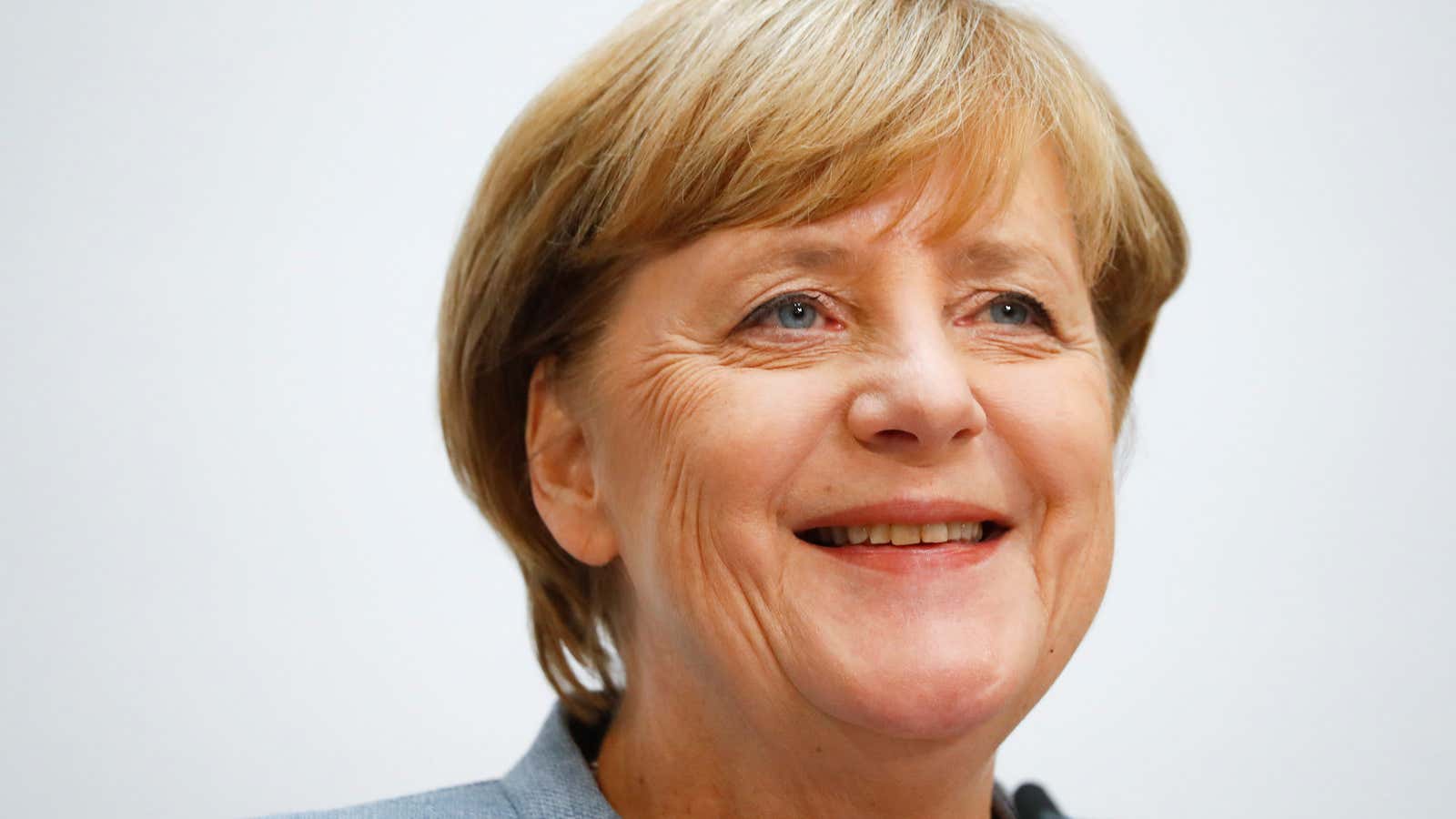What a difference a year makes. After Britain’s Brexit vote in June 2016 and the election of Donald Trump as US president that November, many commentators were convinced that a populist wave was sure to sweep Europe in 2017 as well. But the French election this May and German election this weekend have proven cynics wrong. Of course, Angela Merkel would have preferred to repeat her stronger performances from past elections, but her CDU Party’s victory was nonetheless decisive, despite a surprise showing by the right-wing AFD Party.
As 2017 draws to a close, the past two years have brought into sharper relief the dichotomy between Anglo-Saxon and Continental models of governance: The former now stands for rudderless free-for-all populism and the latter for social-democratic pragmatism.
Though it is merely one year since Trump’s election, recounting all the instances—large, small and still unfolding—of politics undermining common sense is already filling entire books being published in time to fill Christmas stockings. The same goes for the UK, another government doubling down on mandates so poorly designed that one wonders if they were construed by conspiracy to dismantle forever a once great nation.
Between the two Western approaches to governance, it was the Anglo-Saxon model that appeared to carry greater global appeal, whether due to the attractiveness of free market ideology and its loose linkage to innovative dynamism or the grip that the English language still holds worldwide and the global reach it enables for all things American and British. But no more. Every country in the world still wants an MIT or Oxford, a swanky neighborhood like Knightsbridge or a tech hub like Silicon Valley—but no non-Western country aspires to be run like Washington or Whitehall.
The disruptions of the past decade, from the global financial crisis, to Brexit, and Trump, have combined to thoroughly derail the American and British governance models. In the face of crumbling infrastructure and public services, egregious inequality and stagnant policy-making, America’s reflex belief in eternal self-renewal appears somewhere between dangerously complacent and recklessly delusional. At least Britain, for its part, acknowledges that a stiff upper lip won’t suffice to salvage the country from its Brexit debacle. What is most worrying is the utter disconnect between the world-beating social and entrepreneurial dynamism of America and Britain and their total lack of plan to translate this into an inclusive future. There is simply no evidence that either country is ever going to get its act together again, period.
Even as the world watches the American and British train-wrecks unfold in slow motion, few would have expected the global public to take such sustained interest in French and German politics. But Western hopes now lie with these governments in their efforts to achieve reforms at home while buttressing Eurozone growth (which is now trending higher than the US or UK). Wages are rising, unemployment is falling, demand for loans is growing, and exports are rebounding. Most importantly, this being Europe where each year features up a half-dozen elections, politics is stable.
Emmanuel Macron’s Napoleonic impulses notwithstanding (he is, after all, French), his coalition is set to deliver a set of labor market, tax and investment reforms that France has needed for decades. His stratospheric popularity was sure to take a hit, if not for his self-pampering, then for the tough technocratic nature of his proposals. But either way, he is the right man at the right time, and French know they are running out of time to right the ship. Meanwhile, Angela Merkel, despite now facing the task of cobbling together a less stable coalition than she has enjoyed for the better part of the past decade, is likely to push forward with a consensus agenda on renewing infrastructure investments (both industrial and digital), caring for the rapidly aging population and more generous welfare for the marginalized. And together, though Germany continues its fairly strict take on austerity for Eurozone laggards such as Greece, Merkel is clearly willing to work with Macron on a sweep of modifications to European institutions to better coordinate banking, finance and foreign policy.
This is the kind of long-term agenda—backed by action—that is simply unthinkable in the American and British systems today. And the reason for it is as simple as it is profound: Continental Europe actually has functional government institutions. While America and Britain are content to celebrate the theater of democratic campaigns and politics, France and Germany not only have more educated and informed voters but the candidates they have to choose from actually have experience governing cities, provinces and ministries. Equal if not more important is that they also have also strong civil services and well-funded public agencies that are seriously focused on how to expand the availability of affordable housing, create more jobs in urban services, and other long-term priorities.
This gaping dichotomy between state effectiveness within the West is decades in the making, dating back to Reagan-Thatcher era reductions of public service hiring, tax cuts and other morale crippling measures. As a result, even in areas where Americans broadly agree on policy, such as infrastructure or affordable education, that consensus has little chance of translating into execution given the unwillingness to spend substantial capital on future investments and the pernicious special interests that delay and distort the process.
A decade on from the financial crisis that erupted in 2007, it’s easy to remember how America’s initial stock market recovery and reduced unemployment had commentators sneering at the Eurozone’s banking crises and social unrest. But with the virtue of hindsight, it’s clear that the tortoise has defeated the hare. All Western societies face generation defining structural challenges from aging and immigration to entitlements and infrastructure. But only continental European countries exhibit anything like the solidarity necessary to humanely cope with them. Slow and steady wins the race.
